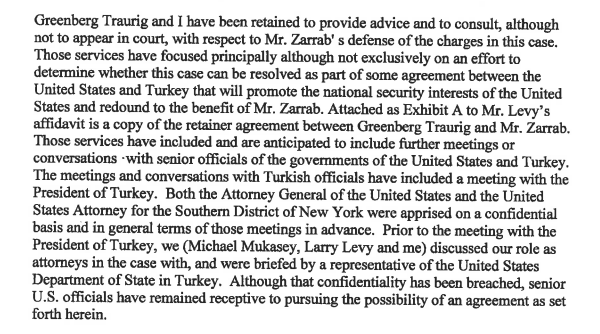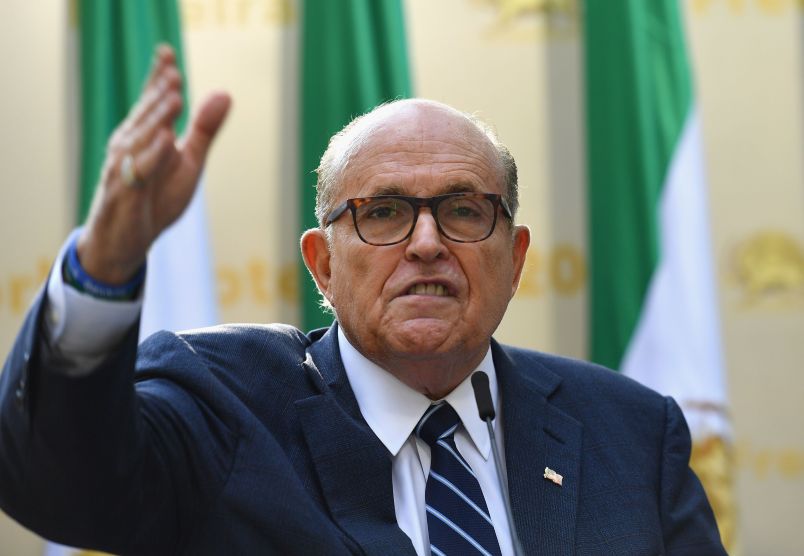He has no position in government, but he sure acts like he does.
We’re learning, on a near-daily basis, about the ways in which Rudy Giulaini has used official channels to pursue his own interests and those of his clients. And his most famous client, the President, has at times encouraged it.
And it’s not just in Ukraine.
In 2017, before he officially joined Trump’s team, Giuliani repeatedly urged Trump to eject the Turkish cleric Fethullah Gulen from the United States, the Washington Post reported Tuesday — which would have been a victory for the Turkish President Recep Tayyip Erdogan. Erdogan has accused Gulen of plotting a 2016 coup against him, which Gulen denies.
“It was all Gulen,” one former administration official said, describing Rudy’s advocacy during visits to the White House. Gulen has lived in a compound in Pennsylvania for two decades.
White House aides reportedly pushed back against Giuliani, but Trump seemed receptive, according to the Post. Erdogan, he reportedly said, is “my friend.” Sarah Huckabee Sanders even said at a press conference that Trump would “take a look” at extraditing Gulen.
Also in 2017, Giuliani advocated for another Turkish priority. He urged Trump and then-Secretary of State Rex Tillerson to lay off one of his clients, Reza Zarrab.
Zarrab, a Turkish Iranian gold trader, faced charges of evading U.S. sanctions on Iran to the tune of billions of dollars. A new federal indictment this week against a state-owned Turkish bank revealed that the effort allegedly involved high-ranking officials in Turkey’s government.
Trump himself joined Giuliani and pressured Tillerson to lay off of Zarrab, per Bloomberg and the Post.
According to the Post, Giuliani and another lawyer on the case, former Attorney General Michael Mukasey, pitched Tillerson in the Oval Office with Trump present.
Trump reportedly told the lawyers, “Guys, give Rex your pitch.”
The proposal involved a prisoner swap: Zarrab for Andrew Brunson, an American in Turkish captivity at the time who was later released. Tillerson was reportedly rattled, flagging the effort to then-White House chief of staff John Kelly.
The pitch followed months of work from Giuliani and Mukasey, who Zarrab had added to his defense team.
Just after Trump’s inauguration, in February 2017, Giuliani and Mukasey even traveled to Turkey and met with Erdogan. They discussed a possible “state-to-state resolution in this case,” as Giulani described in an affidavit filed in April 2017. Giuliani said that the Attorney General and the U.S. Attorney for the Southern District of New York “were appraised on a confidential basis and in general terms of those meetings in advance,” and that he and Mukasey met with a representative of the State Department.

The federal judge in Zarrab’s case was baffled, saying in an interview the next year that he was “stunned” by Rudy’s role.
“I am still stunned by the fact that Rudy was hired to be — and he very actively pursued — being the ‘go between’ between President Trump and Turkey’s President Erdogan in an unprecedented effort to terminate this federal criminal case in the middle of the case,” U.S. District Judge Robert Berman told Courthouse News Service in 2018.
“My head still spins when I consider that,” he added.
Several U.S. officials have offered similar assessments of Giuliani’s semi-pro, unofficial diplomatic efforts to Congress over the last month.
Former Ukraine ambassador Marie Yovanovitch, in recent written testimony, called Giuliani out by name in a reflection on her early departure from Ukraine. (Giuliani has publicly acknowledged pushing Trump to fire Yovanovitch.)
“I do not know Mr. Giuliani’s motives for attacking me,” she wrote. “But individuals who have been named in the press as contacts of Mr. Giuliani may well have believed that their personal financial ambitions were stymied by our anti-corruption policy in Ukraine.”
And in testimony Wednesday, former State Department adviser Michael McKinley reportedly said he resigned from government last week over the sidelining of career diplomats by the Trump administration.
Even Cabinet secretaries found themselves roped into Giuliani’s shadow diplomacy. Energy Secretary Rick Perry, for example, was instructed by President Donald Trump to work with Rudy to address concerns about Ukrainian “corruption.” Perry told the Wall Street Journal Wednesday that, on a subsequent phone call with Giuliani, the Trump lawyer described the pro-Trump conspiracy that Ukraine meddled in the 2016 election.
Trump told the president of Ukraine himself, Volodymyr Zelensky, to get in touch with Rudy about the same topic on the infamous July 25 phone call between the two leaders.
Rudy has at times protested that his diplomatic forays came at the request of the State Department, even publishing texts with former special U.S. envoy to Ukraine Kurt Volker and U.S. ambassador to the EU Gordon Sondland to make his case.
In testimony this week, officials have painted a different picture. In his written remarks before the House impeachment inquiry on Thursday, Sondland said Trump forced him to work with Giuliani.
In written remarks before the House impeachment inquiry on Thursday, Sondland painted a different picture. He said Trump forced him to work with Giuliani.
“We were also disappointed by the President’s direction that we involve Mr. Giuliani,” he said. “Our view was that the men and women of the State Department, not the President’s personal lawyer, should take responsibility for all aspects of U.S. foreign policy towards Ukraine.”







This is how it works in the business world, a free wheeling exchange of deals, and it’s pretty much the wrong way to run a government. We need a well regulated system, where people follow the rules and know their roles, and most presidents have respected that, especially when dealing with a foreign nation. We have the Logan Act to stop people from doing unofficial diplomacy, and this should be a violation of it, but a shadow diplomat working for the president may not have been considered when the act was passed.
And, consider that the entire Trump administration is likely working this way…Rudy has been talking to other nations, and now Barr is out there (which is way out of scope for the AG), and who knows who else is doing it. His kids? Other buddies? It is unlikely that Ukraine is the only nation that was messed with this way, and it’s unlikely that this kine of BS didn’t happen inside the US. Even if impeachment is kept to just the Ukrainian case, the entire Trump administration needs to be examined top to bottom to determine how much bad stuff happened and how to make sure it can’t happen if we get another corrupt politician as president again.
This guy had no position in a federal court. Now he does.
I hope the New York Times is focused on the critical, essential issue here - and sticks to it like glue:
Does he have his own email server?
Is this going to turn out to be not what laws has Trump and Co. broken but what laws didn’t they break?